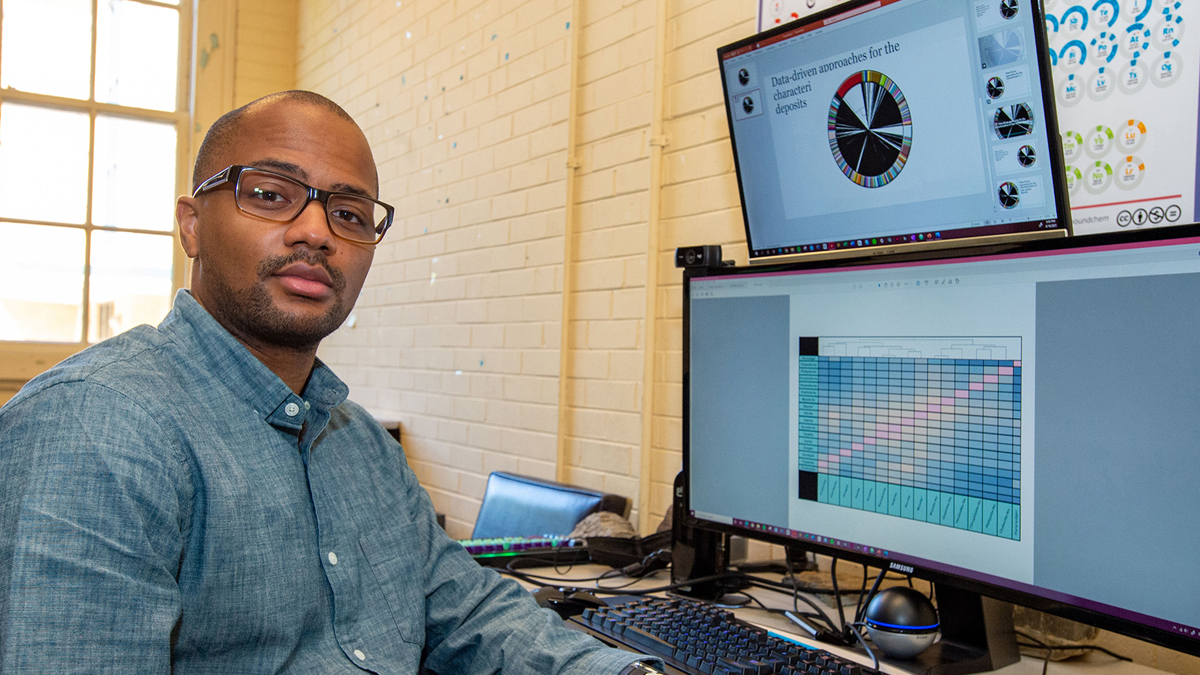
Jason Williams soon will graduate from Southern Illinois University Carbondale with his doctorate in geology. He also recently attended the State Doctoral Scholars Program organized by the Southern Regional Education Board. The conference was aimed at helping minority students such as Williams achieve their goals. (Photo by Russell Bailey)
April 27, 2021
Scholars program helps minority doctoral students pursue faculty posts
CARBONDALE, Ill. — Jason Williams can look at certain geological features of Earth and apply them theoretically to Mars. He soon will graduate with a doctorate in geology from Southern Illinois University Carbondale’s School of Earth Systems and Sustainability and will join the elite group of scientists who study such questions.
Doing the science is one thing. But graduation, with all it entails and implies about starting his actual career as a scientist in higher education, is a bit daunting, he said.
“I am slightly terrified about transitioning from a student to a professional scientist when I graduate at the end of this semester,” Williams said.
Williams, however, is receiving support from an initiative aimed at increasing the number of minority students who earn doctorates and set their sights on becoming a faculty member at a college or university. SIU selected Williams to attend the State Doctoral Scholars Program organized by the Southern Regional Education Board. The conference was aimed at helping students such as Williams achieve their goals.
A complete approach
More than one-third of America’s college students are people of color, yet racial and ethnic minorities make up only small fractions of college faculty. For instance, only about 5% of faculty are African American, about 3% Hispanic and about 1% Native American.
The goal of the program is to increase the number of minority students who earn doctorates and choose to become faculty at colleges and universities. Since its founding in 1993, the program has supported more than 1,800 scholars who have attended 107 institutions in more than 30 states.
The program provides multiple layers of support, including financial assistance and research funding, but also career counseling, job postings and a scholar directory for networking and recruiting.
Mentoring and advocacy for scholars is crucial, and support continues into early careers as graduates become faculty members.
A guiding hand
Williams, who attended the virtual conference on April 16, said it was heavily focused on connecting graduate students with mentors that are active researchers and faculty.
“I think the guidance mentors can provide is an invaluable resource and I am thankful that I was selected for the program,” Williams said.
The conference also included professional development seminars on topics such as proposal writing, leadership development and tips for attaining faculty positions.
“I am hoping that this experience can provide some clues as to what steps I should take next,” he said.
A Baltimore native, Williams said his community continually inspired him to pursue his dreams of becoming a scientist.
“It was the main thing that kept me going throughout graduate school,” he said. “Talking to kids about what I do and listening to their dreams about becoming engineers, programmers and such. It’s kept me motivated to achieve my own dreams. “
Working in higher education after graduation will allow him to do even more for his community and others, he said.
“A faculty position would give allow me to give back to not only my community but all communities that are typically underrepresented in science,” he said.
